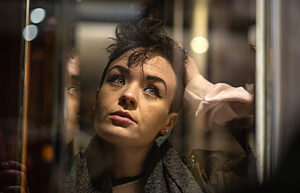
Singer- songwriter Emma Langford told David Hennessy about her new show with fellow songwriters Megan O’Neill and Grainne Hunt, the importance of International Women’s Day and being diagnosed with autism as an adult.
Limerick singer-songwriter Emma Langford comes to London Irish Centre this weekend.
She brings fellow singer- songwriters Megan O’Neill and Gráinne Hunt to perform their ‘Songwriters in the Round’ show for International Women’s Day.
Emma Langford’s debut album Quiet Giant saw her described by Hot Press as ‘a beguiling, distinctive voice’ and won her an RTÉ Folk Award for Best Emerging Artist.
She has since been twice nominated for Best Folk Singer, and once for Best Original Track at the RTÉ Folk Awards.
Emma wrote and independently released her second album, Sowing Acorns, in 2021, to further acclaim.
She climbed the charts with epic folk ballad Birdsong.
It was in 2020 that she joined the ranks of pandemic-inspired musical supergroup, Irish Women In Harmony.
Emma, Megan and Gráinne have played some shows around Ireland and this will be their first show further afield.
How did you three come together. Was it very organic?
“In the case of Gráinne and Megan, I think it was very much an organic thing because they’re both based around the same part of the country and they’ve both done the Nashville thing where they would have experienced the Bluebird Cafe where the in the round format originates.
“They would have seen that and experienced it for themselves and they just thought there’s definitely scope for us to do something like this in Ireland on the road.
“So I guess they made a list of who they wanted to have involved, and I made the cut.
“I suppose the three of us have been on the circuit for roughly the same amount of time.
“We’ve all been on that support slot stage around the same time so it’s cool now for the three of us to be able to share a stage and hear each other’s songs and stories because so often songwriters don’t get to go and see each other and hear those stories and experience someone else’s show.
“We’re up there on stage just celebrating each other which is really cool.”
How have you enjoyed the gigs the three of you have already done together?
“Yeah, it’s been class.
“It’s been really, really cool so far.
“Our first show was in Kildare so that’s Gráinne and Megan’s own home turf.
“The three of us had never done a show together before. The three of us were in a room at the same time for the first time ever that day and there’s obviously the nerves of like, ‘Will we actually gel on stage? We’ve booked a whole tour already so we have to hope we gel on stage. If things don’t work, then we have to do some serious reevaluating…’
“But that night was amazing and the response we got was huge.
“We learned on the spot, on the night, on stage, at the gig that our senses of humour really match.
“We all have this self-deprecating, slightly sarcastic kind of energy to the way we tell our stories and the way we interact.
“We’re not being nicey, nicey with each other or delicate, we’re kind of taking the p*ss out of each other throughout the gig as well which is really fun and it’s a real relief that you can do that on stage with someone.
“I think there’s an awful lot of assumption in the industry if a bunch of women are together on stage that they’re all going to be lovely girls and ‘we’re all best pals’ and all this kind of thing.
“The reality is when we all work together, it’s because we all want to be on stage doing what we do well, and the three of us happened to just get on brilliantly.”
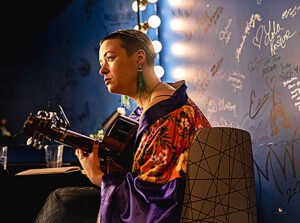
What is the commonality between you three?
“We’re three Irish women.
“We have had very, very different life experiences.
“Gráinne’s in a long distance relationship.
“Megan has a small baby.
“We all have very different lives but I suppose the commonality is growing up in Ireland and being around the same age range, we have that shared generational experience.
“We’ve all worked very hard to be where we are as well.
“None of us were handed this.
“We’re all up here because we’ve earned it.
“We’ve filled rooms and we have built bands and built careers, and now we’re here, stripping it back again to just us and the songs.
“There’s a nice energy to that.
“I think the commonality, really, is just we’re all women who’ve grown up in a relatively similar environment and we’re sharing that from our unique perspectives.
“A lot of our work, between the three of us, is around home actually because we’ve all gone away and come back and we’ve all learned the value of.
“We’re all in our 30s.
“We’re all learning that home is important, community is important, family is important and we talk a lot about that so it’s a nice thing to go around the country and to bring that energy to different rooms from three unique perspectives as well.
“We could have wildly different politics, wildly different stances on things but so far, we have not had any scraps in the dressing room which is great.”
That’s a relief. Is this something you can see continuing? Would the three of you continue and maybe record together?
“Quite possibly.
“There’s no reason to say no to that.
“Every time we work together, we come up with new things we want to do together.
“I suppose down the line we might see ourselves working together to record something.
“As it stands, we’re just enjoying the freedom of the three of us just being on the road together and this thing.
“We don’t have a big band, we don’t have all of that logistical stuff to navigate so we’re just kind of enjoying the freedom of that and just seeing where it goes, I suppose, and letting it be what it is for the minute.”
You’re bringing the show to London Irish Centre. It is a venue you have played before..
“I think the last time was St Brigid’s Day which is a while back.
“I think it was just pre-pandemic.
“I think I was actually due to go over there again when the pandemic hit so I’m really excited to get back now.
“The pandemic feels like a another planet, in a way, because all of our careers were sort of sliced in half and we had to start again when we got back.
“It’s kind of nice to get back to venues I would have visited pre-pandemic and be the person I am now after coming through all of that.”
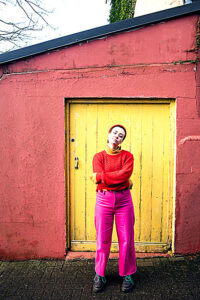
This LIC show is to celebrate International Women’s Day.
You have often been vocal on women’s issues.
I noticed your name in the credits for the short film Fleeting by Lisa O’Connor about the Repeal the Eighth referendum…
“Lisa found Birdsong online and immediately just felt it was a good fit for the film. And I agree.
“Birdsong was written about a million things.
“But it’s funny.
“When I learned I was autistic, I was asked how I’d written about my experience as an autistic person and when I’m talking about being a woman, I’m asked about how much of my music is written about my experience of my gender.
“I’m living both of those things.
“I am an Irish woman who is autistic and nothing I write is ever going to not be about those things.
“I can’t not write about those things.
“I can put myself into the shoes of other perspectives but inevitably, my framework is always going to be those things.
“Birdsong is about being a woman but it could be sung by anyone but when it’s in a film about Repeal of the Eighth and the experience of Irish women around that, it just fits.
“It’s just perfect and getting a chance to play on International Women’s Day is always such a privilege.
“It just feels like I’m given this platform to talk about issues that pertain to me and that matter to me and not everyone has that microphone at that stage so I don’t take it lightly that I have that opportunity, especially getting to travel to the UK where so many women are forced to travel still on a regular basis to access basic health care, reproductive healthcare so to be able to go over to the UK on 8 March and sing my songs on a stage with two other brilliant women feels poetic.
“There’s kind of a poetic mirror being held up there to what Irish women are forced to do on a regular basis.”
Irish Women in Harmony started with the aim of raising money for women suffering domestic violence..
“It was to raise funds for Safe Ireland and we raised- God, I don’t even know how much, hundreds of thousands for Safe Ireland to try and support victims of domestic abuse.
“The responses to those kind of things are always interesting but I think the majority was a really positive response to that.
“You’re always going to have whataboutery but thankfully, in the case of the work that we did in releasing that single, the response was just positive.
“It was needed, we needed to say something and do something and to see so many women’s voices together standing up and saying, ‘We see you and we recognise what you’re going through, and we want to help you’, I think was really important at the time.
“Just this past week in Limerick a news report came out about the number of domestic abuse victims who were denied protection in the courts.
“It’s really disheartening to see that even though there have been many promises around meaningful change in our policy and meaningful change in our legislation around that, you’re still seeing people whose lives are in danger and at risk, people who are living in fear because of a lack of meaningful measures in legislation.
“I don’t think the work there is done.
“I think that’s the reason why International Women’s Day is still such an important and massive day.
“No more than Pride, no more than Day of the Girl Child, no more than Black History Month.
“These things are important because the work continues and unfortunately it needs to continue because the minority of people who still don’t think those days are important or are needed, somehow still have some kind of power and are still making people’s lives incredibly difficult, so we need to keep talking about it.”
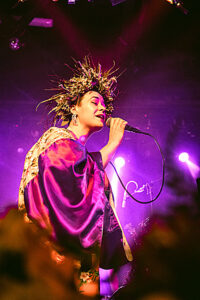
Speaking about Irish Women in Harmony their mission at the beginning was to also address the gender imbalance with radio play.
Now it’s been a few years, do you think things have improved on that front? Are things better for females in the industry? Is there less of an unconscious bias even?
“I find it hard to say.
“I’m at a point in my life and my career where I am quite a self assured person.
“I’m very good at standing my ground.
“I’m very clear on my boundaries.
“I’ve gotten better at talking about fees for gigs, I don’t shy away from talking about money which is something I did when I was younger so for me personally, I have found the industry to be an easier place to navigate.
“But I wouldn’t say it’s the same for everyone and I do think there is still an expectation of women in music to look and behave a certain way.
“Whether it’s conscious or unconscious, there is still an expectation on women to look and behave a certain way which is largely submissive and nice and quiet and polite, and to stick to the music and not worry about the politics.
“That is still very prevalent.
“I know that there is still huge imbalance in festival lineups, still huge imbalance in radio play.
“It’s gotten better.
“It definitely has gotten better but, as I said, with International Women’s Day, with Pride, with any of these things, there’s still so much work to do, so until we are no longer being treated like objects to be manipulated, there is still work to do.”
That’s why it’s important to keep talking about it…
“It’s actually gotten more difficult to keep talking about it because it is assumed, ‘We’ve done that now, we’ve dealt with it. We already had those conversations so let’s move on’.
“But the reality is the issues persist so we are going to keep talking about it.”
You just mentioned the autism there. Is that something you were diagnosed with late on?
“I actually was, I went through the assessment during the pandemic.
“I was doing a fundraising gig online for As I Am, who are an amazing advocacy group for autism in Ireland.
“In the process of researching them, I found a document that talked about how autism looks in women.
“I had no inkling whatsoever of being autistic before looking at this document and, as I looked through it, things started to click: Certain parts of my childhood that I had always had questions about and a lot of stuff that I just had always assumed I was just quirky and socially awkward.
“And as I’m looking through this list, I’m realising I’m not socially awkward, I just have certain needs that have not been really acknowledged or I haven’t respected in myself.
“The assessment was really, really positive.
“It was a really positive experience.
“I came away from it with a much clearer sense of who I am and how I can make my own life easier and better.
“It hasn’t changed who I am, it’s just given me a better sense of who I am.”
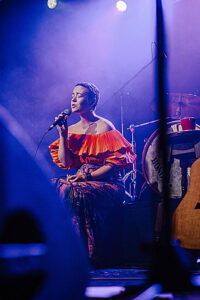
What would you be most proud of?
“Honestly I think just still being here is my proudest achievement.
“I looked back at some old photos of when I started out gigging back in 2016.
“I kind of started taking this whole thing seriously and released my debut EP and really just felt like I was kind of chancing my arm and had no sense of where I was going or what I was doing.
“I was like, ‘I’m just gonna do this for as long as I get away with it’ and I’m still here, and I’m on stage with songwriters I really massively respect.
“I get to meet people who have heard my songs all over the world and who want to come to my shows.
“That, just in itself, is crazy to me, and that is, for me, just a huge thing.
“I’ve gotten emails from people who have had their kids do covers of my songs at there’s a thing called Scór na nÓg.
“That is gorgeous and that is something I’m massively proud of.”
I bet you couldn’t have believed it would take you here when you started out.
I remember last night we spoke you talked about nearly giving music up. I bet you couldn’t have believed you’d be here then..
“Absolutely and every day that I wake up and get to keep doing this as my job is a pinch me moment because as hard as it is and as much work as it is, it’s still a privilege.
“I can’t really imagine myself doing anything else.
“I get to wake up every morning and still call myself a professional musician and tell people this is my full time job and that’s a huge privilege.
“That’s my pinch me moment.”
Emma Langford, Gráinne Hunt and Megan O’Neill play The London Irish Centre with their Songwriters in the Round show on Saturday 8 March.
For tickets and more information, click here.
For more information about Emma, click here.


